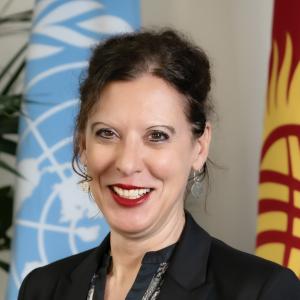National Meeting on Poverty Reduction and Social Mobilization
11 July 2025, 10 AM, Ministry of Economy
Dear Deputy Chairman of the Cabinet of Ministers,
Dear Ministers,
Esteemed partners,
Dear colleagues,
It is a great honor to be here on behalf of the United Nations system at this National Meeting on Poverty Reduction and Social Mobilization. This important initiative once again reflects Kyrgyzstan’s strong commitment to achieving the Sustainable Development Goals in an inclusive and people-centered way.
At the 2023 SDG Summit in New York, President Japarov set out a clear vision to reduce poverty and narrow inequalities, by expanding inclusive, quality education, strengthening universal social protection, and advancing green growth and climate action—–issues which the Deputy Chairman of the Cabinet of Ministers has just identified as intertwined and as crucial for poverty reduction. This vision was reaffirmed at the National Development Forum in November 2023, where poverty and inequality were once again placed at the core of national development.
Next week, the Kyrgyz Republic will present its Second Voluntary National Review, a stocktake of progress towards SDG achievement at the High-Level Political Forum in New York. The VNR reaffirms the national commitments to poverty reduction and to the principle of Leaving No One Behind as core national priorities. It recognizes not only the decline in income poverty, but also the need to address multidimensional deprivations—particularly among women, children, persons with disabilities, youth in informal employment, and communities in mountainous and rural areas.
Together with the recently adopted National Development Program 2030, which outlines bold national targets—reducing poverty to 20%, improving the Human Development Index by ten positions, expanding formal employment, and ensuring universal access to education, healthcare, and social protection—it charts an ambitious roadmap for inclusive and equitable growth.
Dear participants,
We meet at a moment of cautious optimism. Official poverty figures show the decline in poverty in 2024. These gains reflect focused policy actions and growing coordination across sectors. At the same time, over 1.8 million people remain below the poverty line, and more than 7% of the population live just above it—vulnerable to even small shocks. Children are disproportionately affected. One in three, or 954,500, are living in poverty—more than half of all poor individuals. We also heard earlier about the significant regional disparities. For many households, poverty is tied to food insecurity, with 65% of household income spent on food, making healthy diets unaffordable and increasing the risks of malnutrition, especially among children. These figures remind us that poverty is not only about income, but it is a multidimensional challenge linked to access to education, healthcare, decent work and social resilience.
Th the same time, many families still rely on negative coping strategies— pulling children out of school, skipping health visits, or selling assets. In contrast, reducing poverty strengthens human capital, boosts labor productivity, and fosters more inclusive economic growth.
The UN in Kyrgyzstan is working in support of this agenda across three main areas. First, we are helping to strengthen the national poverty data architecture to enable more targeted and equitable policymaking. In partnership with the National Statistical Committee, we support disaggregated poverty monitoring—by age, gender, region, and vulnerability. High-quality data enables smarter, more targeted policies that respond to diverse facets of poverty.
Second, we are aligning programmatic interventions to support sustainable livelihoods, education, health, and employment generation—especially for women, youth, and rural households. Innovations in cash transfers and income-generation programs are being scaled through municipal systems. This approach contributes to the national transition from social assistance to economic inclusion.
Third, we are working to reach those who are furthest behind. Across sectors, we support targeted action for persons with disabilities, children and families in vulnerable situations, remote communities such as women in agriculture, and migrant families. These efforts aim to close persistent access gaps to public services and ensure that opportunities are extended to all.
In all of this, the role of local authorities is essential. As the first point of contact for citizens and the frontline providers of services, municipalities are vital partners in shaping responsive and inclusive solutions and I am very pleased to see so many of you connected today. The SDG Localization Project in Bishkek has shown how local governments, when equipped with data and adaptive tools, can deliver tailored, effective results. Investing in their capacity is key to making sustainable progress.
Equally important is a whole-of-government and whole-of-society approach. Reducing poverty requires joint policies, cross-sectoral coordination and active participation of all segments of society, from national ministries, to municipalities, to service providers, to the private sector, and communities themselves. Only together can we ensure that no one is left behind.
The UN stands ready to continue supporting Kyrgyzstan building a more inclusive, resilient and just future for all and we look forward to Kyrgyzstan presenting progress and the experience in this regard next week in New York and in November in Doha at the Second World Summit for Social Development.
Thank you.
Speech by


















